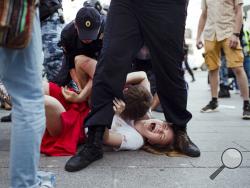MOSCOW (AP) — The young woman screamed as her boyfriend lay atop her, absorbing the blows of a helmeted riot policeman.
It's one of the indelible images of the violent police response to an unauthorized protest in Moscow.
Inga Kudracheva's terror and anguish are clear in the video and photos that spread across Russian social media and foreign news coverage of the July 27 crackdown in which an arrest-monitoring group said nearly 1,400 people were detained.
Yet Kudracheva and Boris Kantorovich say the ordeal has only strengthened them.
"People are not afraid of police anymore. Even though police were beating us violently and tried to intimidate us, it was worth it," the 27-year-old told The Associated Press on Tuesday, sitting on a sofa with Kudracheva and occasionally squeezing her hand reassuringly.
"I'm really scared, but being scared is fine, and there are other things more important than fear," said Kantorovich, who works in sales.
Such determination suggests that the fierce police response might have been a miscalculation, hardening resistance rather than dissipating it. Both police and activists likely will be tested again on Saturday, as protest organizers have called for another unsanctioned rally in the Russian capital.
There have been a series of demonstrations denouncing the exclusion of some opposition and independent candidates from a Sept. 8 election for the Moscow city council. In the past month, the issue has provoked a surprisingly large outcry for a local election; on July 20, about 20,000 people turned out for a demonstration that was the largest in the city in several years.
But that earlier demonstration had been sanctioned. When the July 27 protest was called, authorities were clearly determined to stifle the dissent.
The police actions were "demonstrative cruelty," said Ilya Shablinsky, head of the voters' rights committee of the presidential human rights council, in an interview with the newspaper Kommersant.
Ivan Sustin, a human-rights lawyer, said the police violence was at a level previously seen only in a 2012 demonstration against President Vladimir Putin's inauguration and that the recent protesters were far less aggressive.
The police action came amid declining approval rates for Putin and the dominant United Russia party, whose nominees suffered crushing defeats in several gubernatorial elections last fall.
There has been widespread condemnation of the crackdown. The U.S. Embassy in Moscow decried it as "use of disproportionate police force."
Hugh Williamson, Human Rights Watch's director for Europe and Central Asia, said the "government's strong-arm response is a warning to Russians that people who take to the streets, no matter how peaceful, to demand free and fair elections will face dire consequences."
But Russian authorities show no sign of backing down.
In his first public comments on the disorder, Moscow Mayor Sergei Sobyanin said Tuesday the protesters "forced police to use force that in this situation was completely appropriate."
At the same time, Russia's Investigative Committee opened a criminal investigation for charges of organizing or participating in mass disorder, a crime that carries a potential prison sentence of up to 15 years.
During the July 27 demonstration, police tried to grab Kantorovich as he was sitting on a curb. He curled up as police hit him with their batons, and Kudracheva tried to intervene. Nearby police dogs barked and howled.
Moments later, she was on the pavement with Kantorovich atop her.
"The scariest moment was when I was lying underneath Boris ... and I felt as if the policeman was jumping on him," said Kudracheva, a 27-year-old human resources specialist. "I felt like he was going to crush my chest."
"We were not doing anything," Kudracheva said of the minutes before the melee. "We were not trying to break the cordons. We weren't throwing anything at the police."
Kantorovich was shoved into a police van. After arriving at a police station, he called for an ambulance and went to a hospital for treatment of heavy bruises. Kudracheva suffered only scratches.
By coincidence, Kudracheva also figured in one of the day's other stunning visual scenes, helping to wrap gauze on the head of Alexandra Parushina, her face masked with blood, after she was beaten by police at a different site.
Parushina, a deputy in a Moscow district council, told AP she hadn't known Kudracheva before that earlier incident.
The beating left her with stitches in her head and severe bruises, and she said she was so unwell that she couldn't leave her apartment. But she said she's ready for future protests.
"Well, it may be frightening and dangerous, but on the other hand, I personally can't see another way but to go to these kinds of protests. Otherwise, we just aren't able to overcome this misuse of power," she said.
Kantorovich, who had taken part in previous protests, said the authorities' refusal to register the candidates was a brazen insult: "Candidates who want to run did everything by the book. After that, the system told them 'So you did everything by the book? We're not going to register you anyway.' I feel this is what really angered people."
Lyubov Shangina, a 71-year-old protester, said she was bruised when a policeman grabbed her, but "they didn't detain because they were scared that by taking me I'd drop dead and they'd be responsible."
___
Associated Press writers Tanya Titova, Francesca Ebel, Harriet Morris and Jim Heintz contributed.

